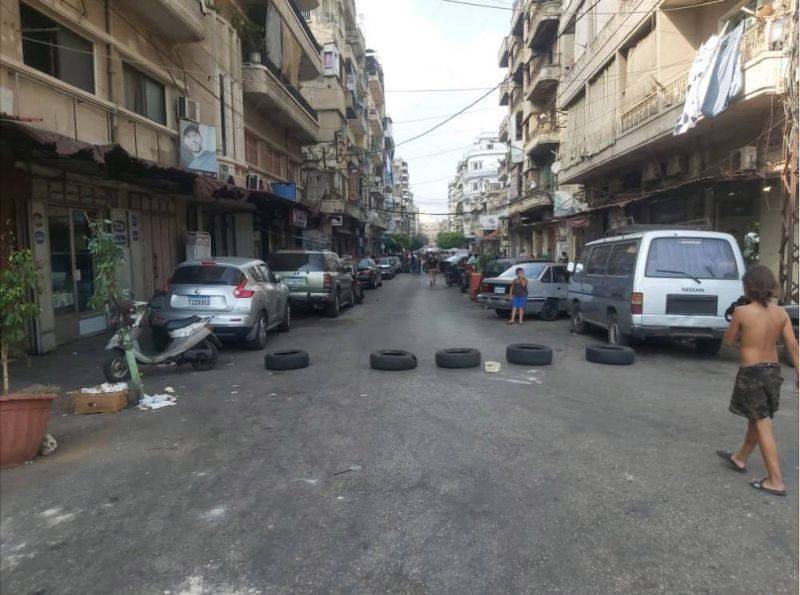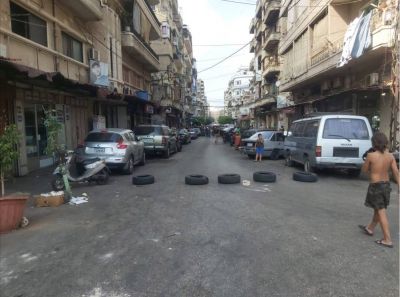
A street in Tripoli is obstructed with tires. (Credit: Sawratcom)
“He is just a version of [Saad] Hariri and Hassan Diab. His arrival at the Grand Serail will only aggravate the situation,” Thara, who hails from the Bab al-Raml neighborhood of Tripoli, says.
The designation yesterday of the son of Tripoli, Najib Mikati, to become Lebanon’s next prime minister was not met with enthusiasm in the city. Only a few hours following the announcement, a dozen people took to the streets, voicing their ire and blocking roads.
“Mikati leads a life of prosperity, abundance and luxury while his city’s inhabitants are marginalized and do not get sufficient food,” Abdel Rahman says angrily while in Tripoli’s al-Nour Square, into which thousands of protesters poured for weeks during the October 2019 uprising.
Since then, local barons have grown unpopular in Lebanon’s poorest city. And Mikati — the telecoms magnate, who, alongside his brother Taha, is accustomed to featuring in Forbes’ annual list of the world’s billionaires and who is worth an estimated $2.7 billion — is no exception.
While being a billionaire has always been an advantage that allows politicians to impose themselves on the Lebanese political arena, it is now perceived by a segment of the street as a symbol of the political class’s plunder of public resources.
“He is one of the ‘Kellon yaaneh kellon’ (‘All of them means all of them’). This person is accused of corruption,” Nahida Khalil, a member of Beirut Madinati, a volunteer-led independent political movement launched in 2016, says. In late October 2019, Mount Lebanon Public Prosecutor Ghada Aoun brought charges involving illicit gains from subsidized housing loans against Mikati, his son Maher, his nephew Azmi and Bank Audi.
In the opposition’s eyes, Mikati’s designation is the authorities’ latest ruse.
“It is simply a way for the ruling class to buy time. It is their final recourse to obtain assistance from the international community. But, everything will remain unchanged, the political class will seek to share power and will take no political measures that would serve the interests of the marginalized population under the economic crisis,” says Karim Safieddine, a member of the Mada Youth Network, which brings together the secular clubs at Lebanese universities’ campuses.
Meanwhile, Henri J. Chaoul, a former member of the Lebanese delegation that negotiated with the IMF in 2020, wrote in a tweet, “Lebanon about to name @Najib_Mikati for PM. Yet, he shared no program, no vision, no plan. When will the people of Lebanon get the respect they deserve and politicians worthy of that name? More of the same. Expect no change.”
Backed by the club of former prime ministers, Mikati’s designation brings things back to square one, according to his detractors, and gives little hope for an end to the political and socio-economic deadlock plaguing the country.
The Azm Movement’s leader served as prime minister twice: in 2005 and in 2011–2013.
“This political class is doing everything in its power to make sure that immunity for the MPs in the investigation into the Beirut port blast will not be lifted,” says a young female resident of the Bohsas neighborhood of Tripoli. She went on to slam Lebanon’s leaders for their apparent willingness to draw attention away from the one-year commemoration of the Aug. 4 Beirut blast.
On social media, many users also pointed out that it was Mikati who was in office as caretaker prime minister when the thousands of tons of ammonium nitrate that exploded in the Beirut port on Aug. 4 last year arrived in the country in late 2013.
This article was originally published in French in L’Orient-Le Jour. Translation by Joelle El Khoury.
